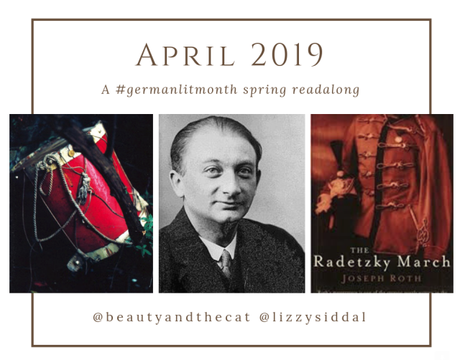
SPOILER WARNING – The answers and questions give away important plot points
Are there characters you like or dislike particularly so far?
While I find all of the characters very interesting and wonderfully drawn, there isn’t any character I particularly like. I feel sorry for many of them, but I don’t think they are particularly likable, possibly with the exception of Chojnicki. I loved the way he spoke about the Kaiser, calling him by hist first name. Was it out of lack of respect? Possibly, but also, I think because he felt that the end of the monarchy was approaching and, rightly so.
What does the old servant Jacques and his death stand for?
There are so many scenes in this book that signify or announce the end of an era but Jacques also announces the end of the von Trottas. He’s the only one who knew the hero of Solferino and with him, this man who has almost been forgotten, through his own doing, is sinking even further into oblivion. The whole death scene was particularly well done and used to great effect. Like the monarchy, he doesn’t die quickly but seems to go back to new life and then dies anyway. A book that’s so heavily preoccupied with death and dying had to have an extended death scene.
In many ways Chojnicki is the opposite of Jacques. What did you think of him?
I mentioned him earlier as one of the few characters I really liked. A modern man, very rich but not in a greedy kind of way. He’s always willing to share and give his money to those who need it. He seems to mind his own business more than anything else. He is alert and curious, also generous and free of self-importance, a typical trait of many of the other characters.
What do you make of this quote?
“I haven’t forgotten him,” said the lieutenant, “I always thought of that painting. I’m not strong enough for this painting. The dead! I can’t forget the dead! Father, I can’t forget anything. Father!”
I felt sorry for Carl Joseph from the beginning of the book, when his first lover, Frau Slama dies. Death got a hold of him and never let go. Although he thinks he’s found new life, with Frau von Taussig, the reader can sense it will be short-lived.
What do you think of Roth’s style so far?
I think I remembered his style differently. As Andrew said in his post on the first part, it feels much more like a 19th century novel. No modernist approaches. Maybe others feel differently, but I don’t think he’s a great stylist. His strengths are characterisation and descriptions. He’s more interested in psychology than beautiful language or original ways to say things.
Were you surprised to find the last chapter of part 2 told from the point of view of Kaiser Franz Josef? How effective did you find it?
I thought it was a great idea and worked very well. It showed the Kaiser as a human being, something people at the time possibly tended to forget. In people’s views he was almost God-like. The chapter shows how isolating this must have been. Most of the time, he had to play a role. Only when he was alone, at night, could he express his true self.
Do you have favorite quotes? Please share them and tell us why you like them.
I have so many favorite quotes but because I read the book in German, I won’t share them. I’m still not feeling well enough to embark on any translations.
When he meets Frau von Taussig, Carl Josef feels like he’s happy for the first time? Do you think that’s true? How do you think of her and their relationship?
Frau von Taussig is a great character. Silly and touching at the same time. But also selfish and self-involved. The way Roth introduced her, with only a remark at first, at the end of one chapter, told the reader she’s trouble. I don’t think she cares about Carl Joseph. One gets the feeling it could have been any young lieutenant. There’s no attempt to understand or get to know him. And so, in the end, she treats Carl Joseph like every one else does. Just a player in play that has lost its meaning. A bit like the Kaiser. Carl Joseph is as lonely and desperate as before, and possibly, without his knowing, worse off than before he met her.
How do you feel about the descriptions of alcoholism in this section?
It’s a chilling description of alcoholism and feels very realistic. Sadly, Roth knew what he was writing about and the reader can sense that.
